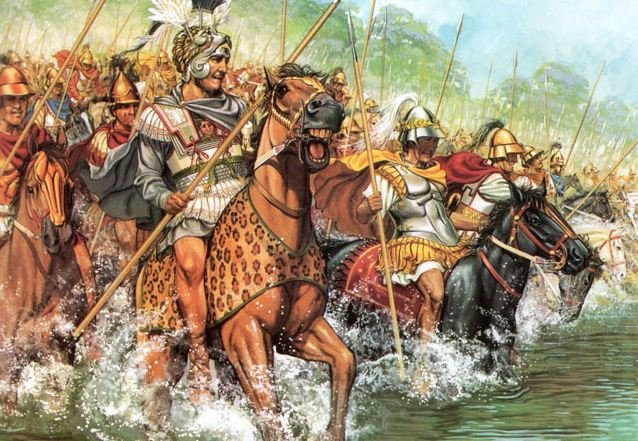TODAY in HISTORY (1 October): Alexander the Great conquered the Persian Empire in 331 BC!
Alexander III the Great (356-323 B.C.) was the King of Macedonia and the conqueror of the Persian Empire to establish the Greek Empire.
Alexander is deemed one of the greatest military geniuses of all times.
He was the inspiration for conquerors like Hannibal the Carthaginian, the Romans Pompey and Caesar, and Napoleon. Alexander’s father was King Philip II who conquered and established Greece as a united front to attack the Persian Empire.

At age 12 Alexander tamed and rode the unruly stallion, Bucephalus, which no one at that stage was able to ride. Bucephalus was the horse Alexander rode in all of his major battles till the very end. When he was 13, the philosopher Aristotle was appointed as Alexander’s personal tutor. During the following three years, Aristotle gave Alexander training in all the major areas of Greek knowledge.
At the age of 18, he took charge of the Companion Cavalry and defeated the Athenian and Theban armies at Chaeronea in 338 BC.
Some ancient historians recorded that the Macedonians won the battle thanks to Alexander’s bravery.
Before King Philip could mobilise his forces to attack the Persian Empire, he was assassinated in the spring of 336 BC. Philip’s death initiated a rebellion among the conquered nations of Greece who saw a chance for independence.
Alexander acted swiftly, and by the end of the summer 336 BC, all the nations of Greece acknowledged his authority.
After gaining the control over the Greek nations, Alexander set out to attack the Persian Empire. As his ship approached the coast of Asia Minor, he threw a spear from his ship and stuck it in the Asian ground. As Alexander stepped onto the shore, he declared to defeat the Persian Empire with the Macedonian spear.
Alexander’s first victory against Persian forces was at the Battle of the Granicus.
He accepted the surrender of the Persian provincial capital and proceeded along the Ionian coast, granting autonomy and democracy to the cities. In spring 333 BC, Alexander crossed the Taurus into Cilicia where he defeated Darius at Issus. Darius fled to regroup his army.
On 1 October (today’s calendar) 331 BC Alexander finally defeated the forces of Darius at the Battle of Gaugamela.
Darius once more fled the field just to be killed by his people. Alexander moved on and captured Babylon, Susa, and Persepolis – capital of the Persian Empire.
On the height of his success Alexander died at the age of 32 in 323 BC in the palace of Nebuchadnezzar II, in Babylon.
It was first speculated to be poisoning, but the general theory is that it was a natural cause – either malaria and typhoid fever.
Sources:
http://www.history.com/topics/ancient-history/alexander-the-great
http://www.historyofmacedonia.org/AncientMacedonia/AlexandertheGreat.html
https://en.wikipedia.org/wiki/Alexander_the_Great#Conquest_of_the_Persian_Empire
Pretty badass guy
I am not very good with ancient history, but I think that the Persian Empire was re-established soon afterwards and was never defeated completely again.
There were other Persian Empires, but not the Medo-Persian Empire which was founded by Cyrus the Great. To distinguish it from the other Persian Empires, it is referred to as the Achaemenid Empire - called after an ancestor of Cyrus, Achaemenes.
The Seleucid Empire, which was the Persian Empire after the Achaemenid Empire, was a division of Alexander's Empire after his death - it was part of what we loosely refer to as the Greek Empire.
Good job. The history of this era is fascinating.
Trying to keep all the intrigue and jockeying for position between the death of Alexander and the solidification of the Roman Empire is tough.
A study of the conquering of Judah is pretty amazing too. So much happened that was uncharacteristic of Alexander, and baffled his generals.
The Greek Empire fills the gap in the Bible between Malachi and Matthews - the 400 years of silence. During this period there were many revolts from the Jews against the Greeks. The best-known one is the Maccabean revolt from 167 to 160 BC lead by Judah Maccabee.
Right, so the book of Maccabees gives us some insight, if a bit biased. It's an excellent historical resource. Josephus gives us some insight too, but he has a reputation of perhaps for writing things they way he wanted to see them. :)
There was the initial conquering of Judah by Alexander though. It's very interesting - more of a surrender with mutual respect. I couldn't do it justice trying to recount it by memory. Maybe I'll look up my resources and write an account of it. It's one of those lost gems that's truly amazing.